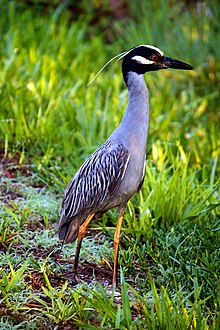Nyctanassa is a genus of night herons from the Americas, especially (but not exclusively) warmer coastal regions. They were formerly included in the genus Nycticorax, but today all major authorities recognize them as distinct.
| Nyctanassa | |
|---|---|

| |
| Yellow-crowned night heron (N. violacea) | |
| Scientific classification | |
| Domain: | Eukaryota |
| Kingdom: | Animalia |
| Phylum: | Chordata |
| Class: | Aves |
| Order: | Pelecaniformes |
| Family: | Ardeidae |
| Subfamily: | Ardeinae |
| Genus: | Nyctanassa Stejneger, 1887 |
| Type species | |
| Ardea violacea Linnaeus, 1758
| |
| Species | |
|
N. carcinocatactes (extinct) | |
Taxonomy
editThe genus Nyctanassa was introduced in 1887 by the Norwegian born zoologist Leonhard Stejneger to accommodate a single species, the yellow-crowned night heron, which is therefore the type species.[1][2] The genus name combines the Ancient Greek nux meaning "night" with anassa meaning "queen" or "lady".[3]
Species
editThe genus contains the following two species:[4]
| Image | Scientific name | Common Name | Distribution |
|---|---|---|---|
| †Nyctanassa carcinocatactes (extinct) | Bermuda night heron | Bermuda. | |
| Nyctanassa violacea | Yellow-crowned night heron | south Florida, the Gulf Coast (Louisiana to Alabama), and the eastern Texas coast; Mexico, Central America, Galápagos - Ecuador, the Caribbean and northern South America (south to Peru and Brazil in coastal regions) |
References
edit- ^ Stejneger, Leonhard (1887). "Review of Japanese birds: V. Ibises, storks, and herons". Proceedings of the United States National Museum. 10 (628): 271–319 [295, Footnote]. doi:10.5479/si.00963801.10-628.271.
- ^ Mayr, Ernst; Cottrell, G. William, eds. (1979). Check-List of Birds of the World. Vol. 1 (2nd ed.). Cambridge, Massachusetts: Museum of Comparative Zoology. p. 227.
- ^ Jobling, James A. (2010). The Helm Dictionary of Scientific Bird Names. London: Christopher Helm. p. 277. ISBN 978-1-4081-2501-4.
- ^ Gill, Frank; Donsker, David; Rasmussen, Pamela, eds. (December 2023). "Ibis, spoonbills, herons, Hamerkop, Shoebill, pelicans". IOC World Bird List Version 14.1. International Ornithologists' Union. Retrieved 4 August 2024.
Further reading
edit- "Check-list of North American Birds". American Ornithologists' Union. 1998–2006. Archived from the original on 2007-07-23. Retrieved 2007-07-29.
- Holloway, Joel Ellis (2003). Dictionary of Birds of the United States: Scientific and Common Names. Timber Press. p. 134. ISBN 0-88192-600-0.
- "The Internet Bird Collection". Handbook of the Birds of the World. Retrieved 2007-07-29.
- Peterson, Alan P. (Editor). 1999. Zoological Nomenclature Resource (Zoonomen). Accessed 2007-7-29.
- Remsen, J. V., Jr., C. D. Cadena, A. Jaramillo, M. Nores, J. F. Pacheco, M. B. Robbins, T. S. Schulenberg, F. G. Stiles, D. F. Stotz, and K. J. Zimmer. [Version 2007-07-29.] A classification of the bird species of South America. American Ornithologists' Union. Accessed 2007-04-10.